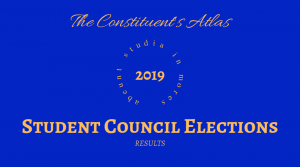Analysis
May 15, 2019
Analysis
Turnout seems to be on the rise, though it is impossible to determine whether this year’s increase was indicative of a broader trend. The 15.4 percentage point difference in turnout rates between freshmen and juniors is particularly interesting, and will likely inform future campaigns as the Class of 2022 matures; youth-centric populism may well become a campaign strategy. Alternatively, the turnout differential could be just another sign of the creeping spread of senioritis to younger students. Further study is needed.
All elected officials have more or less given lip service to the concepts of student involvement and school spirit. Both of these developments are nice, it is true, but unless substantive changes are enacted by Student Council itself, nothing new will come to pass. Student involvement and school spirit are perennial campaign topics in Student Council elections; like dandelions in the rolling green meadows of the springtide, they sprout and swell to golden glory and then, puff, they are but blowing in the wind. The WikiHow guide to student council elections might as well include a lexicon of prolefeed such as school spirit and friends.
In Our Opinion: Reform the Electoral System
Student Council declined to release margin-of-victory data to The Forest Scout, citing privacy concerns; consequently, it is impossible to determine how much of a mandate the individual members of the Executive Board have. Further, turnout rates, while high, are nowhere near high enough to give an accurate picture of schoolwide consensus. While Student Council may have legitimacy, most officials likely do not.
Turnout cannot be significantly increased in the traditional manner, through the use of posters, email, social media, and the like to promote voting. There are perhaps forty-two students in the building who actually read posters, many students do not check their email, most social media is blocked on-campus, and some of us avoid social media whenever possible in a desperate (yet futile) resistance to the modern invasions of privacy.
There is also the minor detail that restricting voting to people who check their email at least once every three days — and denying it altogether to seniors — is most certainly disenfranchisement and does not instill democratic values as Student Council ought to.
The electoral system is wanting of fundamental reform to address these problems. Voting should be conducted with printed ballots and actual polling places at various points around the school in as obnoxious a manner as possible. Turnout must be significantly raised to instill democratic values and make Student Council elections more illuminating and competitive; public and proper elections will help us get there.
This touches on the broader argument for Student Government. The quote “democracy must be reborn in every generation and education is its midwife,” seemingly so often cited here at LFHS, strikes me as deeply amusing. Are we actually expected to think that democracy works after a torrent of elections where nothing happens except a puff of sparkly dust and flashy lights? Curious, how our elders are screwing up the planet (and the country) and instilling a deep-seated apathy to democratic processes within us through the impotency of student councils — very curious indeed.
Student Council elections must mean something; there must be show, there must be substance. Until we have a democratic, sovereign student government that can force discussions about issues pertinent to students’ lives and act directly in the interests of the student body, election turnout will remain low, the work will no longer go on, the cause will not endure, the hope will perish, and the dream — that marvelous, fleeting dream of democracy — will at last die.
All this is a rather morose way to say that the most recent elections are a step in the right direction but that more reforms are needed.






